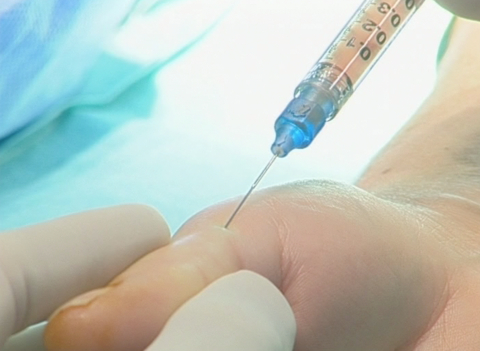Paracrine Receives FDA Approval to Launch a U.S. Pivotal Trial in Patients With Hand Dysfunction Due to Diffuse Cutaneous Scleroderma
Paracrine Receives FDA Approval to Launch a U.S. Pivotal Trial in Patients With Hand Dysfunction Due to Diffuse Cutaneous Scleroderma
Pivotal trial to support marketing approval of regenerative cells processed with the Celution® System to commence in Q2 2022
SAN DIEGO--(BUSINESS WIRE)--Paracrine, Inc. announced today that the FDA has granted full approval of its Investigational Device Exemption (IDE) to conduct a pivotal trial titled Scleroderma Treatment with Celution Processed Adipose Derived Regenerative Cells: A Randomized, Double-blind, Placebo-Controlled Study - the “STAR II Trial.”
The STAR II Trial is a Pivotal Trial designed to provide a robust data set on the safety and efficacy of adipose derived regenerative cells (ADRCs) in the treatment of patients with hand dysfunction due to diffuse cutaneous scleroderma.
“There are no curative treatments available for hand dysfunction. Results of prior studies of Celution-processed ADRCs found that the therapy was well tolerated and showed preliminary evidence of efficacy in this patient population,” noted Dr. Dinesh Khanna, Professor of Rheumatology at the University of Michigan, the largest Scleroderma Clinical Center in the U.S., and Co-Principal Investigator for the STAR and the STAR II Trials. “STAR II is a large, well-designed pivotal phase III trial that assesses the clinical benefits of Celution-processed ADRCs in patients with diffuse cutaneous scleroderma and hand dysfunction, a large unmet need,” continued Dr. Khanna.
“We are pleased to have received IDE approval and look forward to initiating our pivotal study with our novel platform in this important indication,” said Christopher J. Calhoun, CEO of Paracrine. “We are excited to collaborate on this study with our esteemed co-PIs and Steering Committee.”
Dr. Robert Spiera, Director of the Scleroderma, Vasculitis, and Myositis Center at Hospital for Special Surgery, and a Professor of Clinical Medicine at Weill Cornell Medical College, added, “I am pleased with the opportunity to co-lead the STAR II trial with Prof. Khanna. I participated in the original STAR study and look forward to verifying our promising initial observations in this well-controlled, randomized, double-blind study.”
About Paracrine
Paracrine, Inc. is a biotechnology company developing the world’s first device-based disease modifying cell therapy platform to treat debilitating chronic conditions.
About Celution® System
The Celution® System is a proprietary medical device designed to process human adipose tissue to extract, isolate, and concentrate a mixture of adipose derived regenerative cells (ADRCs) for subsequent reimplantation in the same patient
About Diffuse Scleroderma
Scleroderma is a rare and chronic connective tissue disease generally classified as an autoimmune rheumatic disorder. The word “Scleroderma” is derived from two Greek words: “sclera,” which means hard, and “derma,” which means skin, as hardening of the skin is one of the most visible manifestations of the disease.
Diffuse cutaneous scleroderma (also known as systemic sclerosis) is a debilitating chronic disease affecting predominantly women and leading to significant disability, including hand dysfunction
An estimated 200,000 Americans have scleroderma, about 80,000 of whom have the systemic form of the disease, known as systemic sclerosis (SSc). SSc is further sub-classified as diffuse cutaneous or limited cutaneous SSc. An estimated 40,000 patients have diffuse cutaneous SSc, the more severe disease with significant hand dysfunction.
Systemic Sclerosis contributes to hand impairment through inflammatory arthritis or inflammation of the joints, joint contractures, Raynaud’s Phenomenon (RP, skin discoloration resulting from narrowing of the blood vessels in response to cold, emotional upset, or stress), digital ulcers, puffy hands, skin fibrosis over the fingers and hands, and calcinosis (calcium deposits in the soft tissues of the hand). These manifestations contribute to difficulty with occupational and daily living activities, impacting quality of life. There are currently no effective treatments available for hand impairment.
Note: The Celution® System and ADRCs are not currently approved in the U.S.
Cautionary Statement Regarding Forward-Looking Statements
This press release includes forward-looking statements regarding events, trends and business prospects, which may affect our future operating results and financial position. Such statements, including, but not limited to, those regarding our ability to initiate and execute the pivotal STAR II Trial, and our ability to support a PMA application, are forward looking statements. Such statements are subject to risks and uncertainties that could cause our actual results and financial position to differ materially. Some of these risks include clinical and regulatory uncertainties, the challenges inherent in convincing physicians and patients to adopt the new technology, dependence on third party performance, performance and acceptance of our products, and other risks and uncertainties. Paracrine assumes no responsibility to update or revise any forward-looking statements contained in this press release to reflect events, trends or circumstances after the date of this press release.
Contacts
Media
Richard Laermer
+1 646-517-4340
Paracrine@RLMpr.com
Investor
Christopher Calhoun
+1 858-923-1200
IR@paracrine.com

